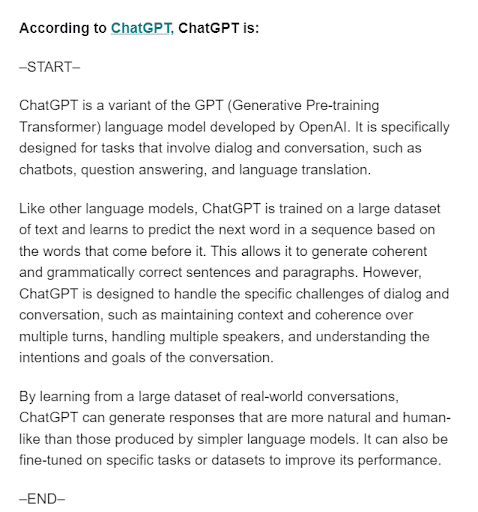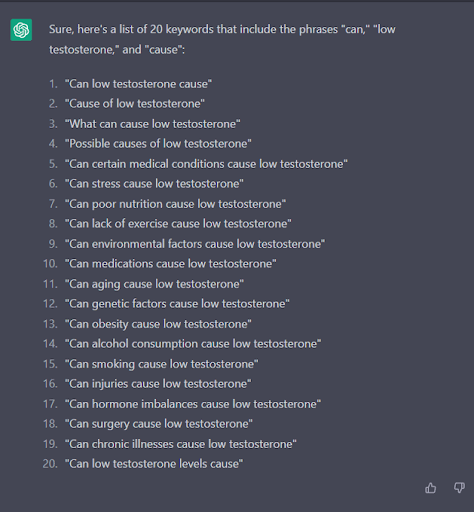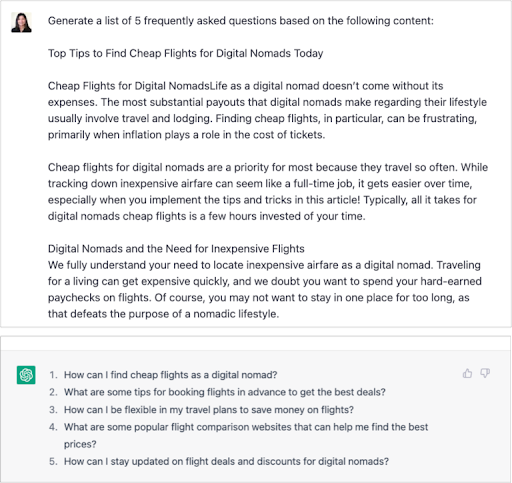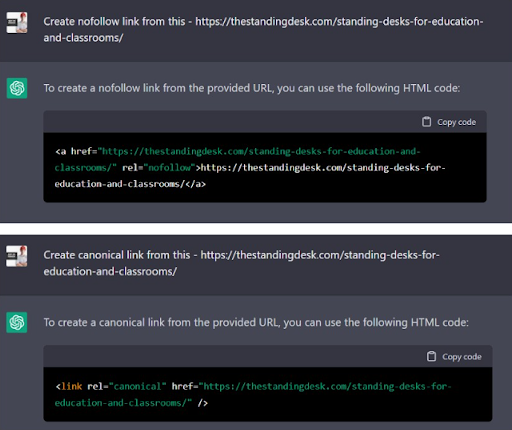ChatGPT is a hot topic right now. With artificial intelligence (AI) continuing to enter our lives more and more, as well as our workplace, it is crucial to understand what it is, what it is capable of and how best to utilise it. We’ve taken a look into ChatGPT and some of the best ways we can utilise it to make us more productive.
What is it?
ChatGPT is short for Chat-based Generative Pre-Trained Transformer. It is a type of AI called a natural language processing (NLP) model that has been developed by the team at OpenAI. This form of AI has been built to understand written and spoken language and generate responses based on what the user inputs into it. Having been trained on a mammoth amount of text data it is able to understand the content and meaning of the words and phrases inputted and generate extensive, highly relevant responses.
Here’s how ChatGPT explains itself:
What can it do?
ChatGPT is the upgrade of it’s little brother InstructGPT. This AI was previously trained to, you guessed it, take instructions and directions from people and deliver answers to questions.
ChatGPT incorporates this technology into itself which allows it to take instructions from humans and create outputs based on those instructions.
It can write essays, code, generate ideas for content and keywords and much more provided you input clear instructions.
How can it be used for SEO?
There are a lot of potential SEO uses for ChatGPT that can help speed processes, generate ideas and improve output, here are some we found particularly useful.
1. Keyword Generation and Mapping
While we still rely on our usual SEO tools for keyword research, utilising ChatGPT can be a quick way to get a list of starting points and suggestions to then research in more detail. It can even group them together to make them easier to analyse, for example by grouping them based on semantic relevance.
2. Content Briefs and Outlines for Copywriters
Content briefs can be a lengthy process and so using ChatGPT to generate your outline based on content topic and desired keywords can speed up the process. Once it has created an outline you can go through and populate it with the nitty gritty details to then send off to be written. ChatGPT is also a great place when looking for some initial blog ideas.
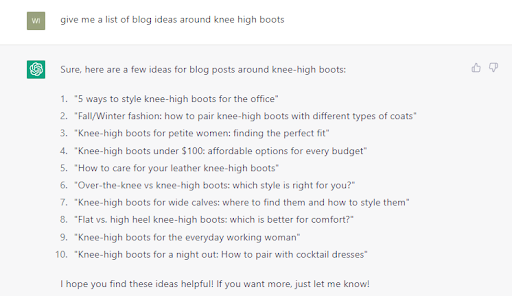
3. FAQs
Another use of ChatGPT to save you some time is by getting it to generate a list of FAQs based on a certain topic. Once you have a list you can cross reference them with search volumes and intent to ensure they are relevant to your product/service page before building them out.
4. Scheme Mark-up, nofollow & Canonical Tags
Yes, ChatGPT can even write code for you to save you time. Providing it with the instruction to generate a nofollow or canonical tag for a certain URL will be enough for it to create one for you. However, this may be hard to do on scale.
5. Meta Tags
A great way to use ChatGPT effectively is to ask it to generate your meta titles and descriptions. It has the capability to do this in bulk based on your desired pages and keywords saving you a lot of time.
There are many more uses for ChatGPT such as getting it to proofread your work, translate copy on a larger scale and generate complete articles for you. However there are some issue that come with doing these, for instance ensuring your site isn’t penalised for using auto-generated content and making sure the content actually makes sense and is correct.
General Limitations of ChatGPT
OpenAI does list some limitations of ChatGPT on their site as the technology is always being trained and improving. Here are some of these limitations:
- ChatGPT sometimes writes plausible-sounding but incorrect or nonsensical answers.
- ChatGPT is sensitive to tweaks in phrasing. For example, it may have no response to one set of input, but when changed slightly it can answer it.
- The model often produces very wordy responses and overuses certain phrases. This is due to trainers preferring more comprehensive answers.
These are something to keep in mind when crafting your requests and questions for ChatGPT.
The Advantages of ChatGPT for SEO
The core advantage of using ChatGPT is to make working more efficient and speed up some processes that can be time consuming. For example, by getting AI to write the bulk of your content briefs and meta tags so you only have to spend your time using your expertise checking, adding details or key information and proofreading this can only streamline your current process.
However, there needs to be human intervention when using AI tools such as ChatGPT. It is best to use it to get a framework, list of keywords, ideas for content etc and then use your own expertise to sift through, find what is useful and create your desired output manually. With the Helpful Content Update it is even more important to ensure that the content across your site adds value to the user and not just targets keywords.
The Disadvantages of ChatGPT for SEO
On the other hand, AI content is detectable by Google despite there being a lot of discussion about the extent it can decipher what content is auto-generated.
AI content has been around for a long time and has been something Google has targeted for years. As AI advances so will the Google bots detecting it. Like with fake news there will always be content that slips through the gaps and is hard for Google to judge and ChatGPT is a prime example of this as it has been built to imitate human characteristics.
AI-generated content is deemed to come under the bracket of auto-generated content and therefore would be considered to be in breach of Google’s Webmaster Guidelines.
Here’s what Google’s John Mueller had to say on content generated automatically using AI writing tools and whether it violates Google’s Webmaster Guidelines:
“For us these would, essentially, still fall into the category of automatically generated content which is something we’ve had in the Webmaster Guidelines since almost the beginning.
And people have been automatically generating content in lots of different ways. And for us, if you’re using machine learning tools to generate your content, it’s essentially the same as if you’re just shuffling words around, or looking up synonyms, or doing the translation tricks that people used to do. Those kind of things.
My suspicion is maybe the quality of content is a little bit better than the really old school tools, but for us it’s still automatically generated content, and that means for us it’s still against the Webmaster Guidelines. So we would consider that to be spam.”
So, there you have it. ChatGPT is here and it’s making waves. Head over to ChatGPT and give it a try yourself! If you’d like to talk to me about my thoughts or about SEO, please get in contact.


